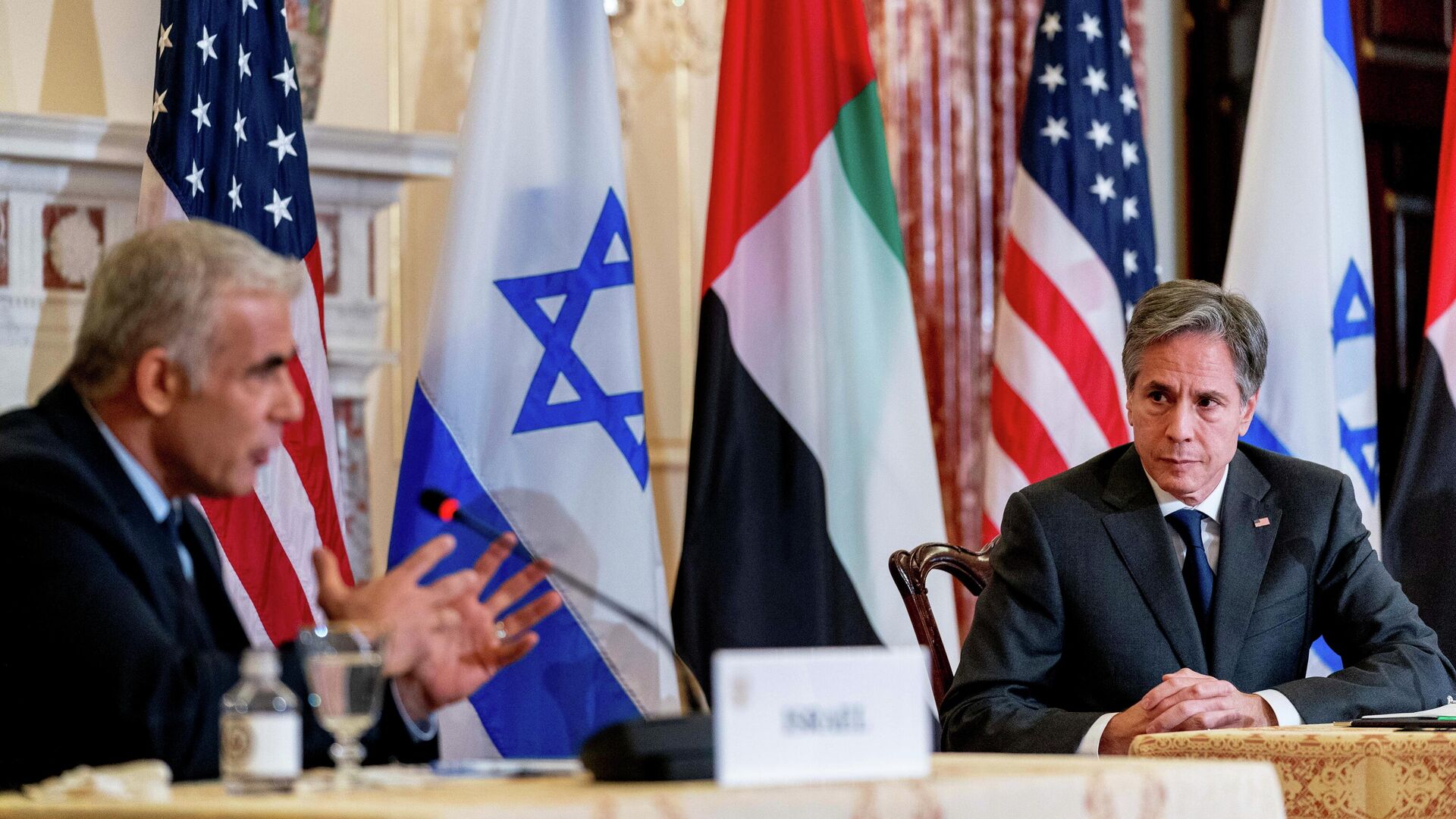Blinken Warns Israel’s Lapid of ‘Risks to Shared National Security Interests’ From Chinese Projects
20:43 GMT 13.10.2021 (Updated: 13:25 GMT 06.08.2022)

© REUTERS / Andrew Harnik
Subscribe
During a Wednesday meeting with Israeli Foreign Minister Yair Lapid, US Secretary of State Antony Blinken reportedly cautioned him to control Chinese investment in the Israeli economy, something the US has pushed for since the Trump administration, which extensively demonized Chinese tech and construction firms.
A senior US State Department official told reporters via teleconference on Tuesday that at the Wednesday summit in Washington, DC, Blinken would “be candid with our Israeli friends over risks to our shared national security interests that come with close cooperation with China.”
While Blinken and Lapid had their own separate meeting, they were also joined later for a trilateral conference by Abdullah bin Zayed, foreign minister of the United Arab Emirates, which signed a peace agreement with Israel just over a year ago.
The same State Department official later said that “the US views China as a competitor that challenges the existing international rule-based order. And as we’ve said previously, our relationship with China will be competitive when it should be, collaborative when it can be, and adversarial when it must be.”
‘China is Not a Friend of the Region’
Since the prior US administration of Donald Trump, the US has moved to excise Chinese firms from the economies of the US and its allies, especially Chinese tech companies like Huawei, which it has claimed are security liabilities. However, the accusations have ranged across industries, including Shenzhen-based drone maker Da-Jiang Innovations (DJI) and China Railway Construction Company (CRCC).
China Civil Engineering Construction Corp., a subsidiary of CRCC, has worked on a number of projects in Israel over the last decade, including digging the Gilon Tunnel on the rail line connecting Haifa and Karmiel, working on the Carmel Tunnels project underneath Haifa, and Tel Aviv Light Rail’s Red Line, according to the Jerusalem Post.
Biden administration officials urged Israeli national security adviser Eyal Hulata during a visit to Washington last week to establish a more robust system for vetting projects in Israel by foreign-owned companies, particularly Chinese firms.
According to the Post, senior Israeli defense officials have also pushed Bennett to form a new committee for the purpose, staffed by senior intelligence and defense officials and under Hulata’s purview. A previous committee formed in 2019 is part of the Finance Ministry and does not cover parts of the economy in which China invests.
In August, CIA Director Bill Burns told Israeli Prime Minister Naftali Bennett the US was concerned about Chinese investments in Israel’s tech and infrastructure sectors, including port facilities in Ashdod and Haifa and Tel Aviv’s newest tram line. However, a senior Israeli official told Axios that “we told the Americans we welcome US infrastructure companies to work on big projects in Israel, but they don’t apply to the tenders.”
Bennett notably opposed US attempts to restrict Israeli trade with China as an MK, before he became prime minister this past June.
The proposal was floated in a December 2020 paper by Mark Dubowitz and Jonathan Schanzer at the Foundation for Defense of Democracies, a hawkish neoconservative think tank in Washington, DC. They claim China aims to “extract ... expertise in machine learning, artificial intelligence, quantum computing, edge computing, and other cutting-edge technologies – all in an effort to accelerate China’s aggressive efforts to modernize its military.”
Blinken’s predecessor, Mike Pompeo, also pushed Jerusalem during an August 2020 visit to block Chinese firms like Huawei from any work on 5G internet projects in Israel, but also to trim cooperation with Beijing in general as a form of punishment for continuing to buy Iranian oil in violation of US “maximum pressure” sanctions against Tehran.
"China has made its bed with Iran,” Brian Hook, Trump’s special envoy to Iran, told Axios at the time. “We think it is important to not let China have it both ways. They can’t strengthen Iran, which chants 'Death to Israel,' and have a business-as-usual relationship with Israel. We have been very clear about that. I am sure Israel will do the right thing on China."
"It says a lot about China that they vote no to extend the arms embargo on Iran and enter a strategic agreement with Iran that will not be good for the security of Israel or the Gulf countries,” Hook added. "People need to recognize that China is not a friend of the region. China does not share Israel’s security interests or those of our Gulf partners. It is important that we work together to counter China’s efforts to strengthen Iran."
"Ask yourselves if you think China will ever be committed to Israel’s security as the US is, or promote agreements like the Abraham Accords," David Schenker, Trump’s assistant secretary of state for Near East Affairs, said in a December 2020 Zoom speech hosted by the Sino-Israel Global Network & Academic Leadership (SIGNAL) think tank.
China responded to the accusations in a March 2021 statement from its embassy in Tel Aviv, calling fear China had “penetrated” the Israeli economy “ill-founded” and a “falsehood.”
“China-Israel cooperation is nothing else than normal business practice based on market supply-demand. Projects led by Chinese companies are advanced with open and transparent bidding procedure in Israel. They abide by Israeli laws and regulations strictly. Chinese investment contains no hidden geopolitical agenda, no attached political strings nor threat to Israel's national security. Such slanders scatter before facts,” Ambassador Cai Run wrote in a statement.
“Israel is an independent sovereign nation. China respects Israel's legitimate security concerns and intends not to harm its special relationship with other countries.”

